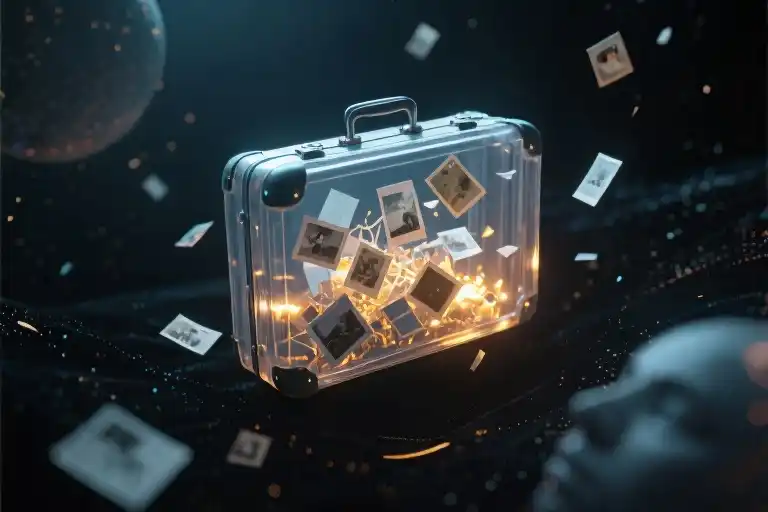The screen glows blue in the darkness—3:17 AM, and your thumb hovers over that familiar profile picture for the twenty-seventh time this week. The last message still reads ‘seen,’ that digital tombstone marking where conversations went to die. You trace the date with your fingertip: two months, fourteen days of silence dressed as indifference.
This is the peculiar agony of almosts—relationships that never earned capital letters, never made it to Facebook official, yet carved canyons in your chest. The world dismisses your grief with shrugs: ‘It wasn’t even real.’ But the ache in your ribs when that song plays? The way your lungs collapse when you smell their cologne on a stranger? Those reactions don’t care about semantic debates.
Situationships leave scars without the courtesy of visible wounds. There’s no breakup playlist for connections that never got named, no support group for mourning potential. Just you, your phone, and the cruel arithmetic of counting how long it takes someone to stop caring.
‘Almost’ might be the most devastating word in love’s lexicon. It carries the weight of everything that nearly was—the Sundays that could’ve been hungover in their sheets, the inside jokes that died mid-formation, the future you sketched in invisible ink. Unlike clean breakups, these ambiguous losses offer no closure, just endless revision: ‘Was I too much? Not enough? Did any of it matter?’
The cruelest part? You have no right to your own sadness. Try explaining to friends why you’re crying over someone who was ‘just talking’ to you. Watch their eyebrows knit when you can’t produce a single Instagram couple photo as evidence it existed. Modern dating created this purgatory—relationships with expiration dates baked in, emotions treated like limited-time offers.
Yet here’s the truth they don’t tell you: Pain needs no permission. Your grief is valid whether it came from a decade-long marriage or a situationship that lasted three vulnerable months. Those stolen kisses in Uber backseats? The way they’d tuck your hair behind your ear while pretending not to care? Those were your real things. You don’t need a label to justify missing them.
So tonight, when you’re measuring the silence between their last message and your dignity, remember: Almost love still counts. The heart keeps score differently than social media does. And right now, yours is simply asking—in the quietest way it knows how—to be witnessed.
The Unmourned Loss: When Relationships Die Without Funerals
There’s a particular ache that lives in the space between ‘something’ and ‘nothing’ – those connections too real to dismiss yet too undefined to claim. These are the almost-relationships, the situationships, the ‘we were talking for six months but never put a label on it’ sagas that leave us grieving losses society refuses to recognize.
Unlike traditional breakups with their clear endings and mourning rituals, almosts disappear like morning fog – no dramatic breakup scene, no mutual friends choosing sides, no box of mementos to ceremoniously burn. Just… silence. The absence of closure becomes its own presence, haunting in its emptiness. At least with conventional breakups, there’s the cold comfort of knowing you were important enough to someone that ending things required actual words.
What makes these nebulous connections so devastating is their structural ambiguity:
- No commitment means no agreed-upon rules for departure
- No labels create linguistic homelessness (‘ex’ doesn’t fit, ‘friend’ feels false)
- No explanation leaves the mind constructing endless possible reasons
- No witnesses makes the pain feel illegitimate
Consider how differently we treat these losses. When someone mourns a five-year marriage ending, we bring casseroles and offer condolences. But grieve a six-month undefined connection? You’ll likely get eyebrow raises and ‘it wasn’t even real’ dismissals. This societal invalidation compounds the original hurt, creating what psychologists call ‘disenfranchised grief’ – sorrow that isn’t socially sanctioned.
The modern dating landscape has turned these almost-relationships into an epidemic. A 2022 study by the Kinsey Institute found that 68% of singles aged 22-35 had experienced at least one situationship, with 43% reporting the emotional fallout rivaled that of a formal breakup. Yet our cultural scripts for processing this pain remain woefully underdeveloped.
Which flavor of ambiguous loss cuts deepest? Is it:
- Ghosting – The sudden radio silence that leaves you checking your phone like a detective at a crime scene
- Breadcrumbing – Just enough intermittent contact to prevent healing
- Situationship purgatory – Perpetually ‘figuring things out’ while acting like a couple
- The phantom ex – Someone who reappears just as you start moving on
These modern relationship limbo states share a common cruelty: they deny us even the dignity of a proper ending. Like unfinished sentences, they hang in the air indefinitely, leaving us to write our own conclusions – usually the most painful ones possible. The human mind craves resolution so intensely that we’ll manufacture it from silence, often blaming ourselves when no other explanation appears.
Perhaps this explains why almosts haunt us longer than clear-cut breakups. Research on the Zeigarnik effect shows our brains remember interrupted tasks 90% better than completed ones. Unfinished relationships become cognitive splinters our minds can’t stop worrying at.
In the quiet hours, these non-relationships demand the same emotional labor as real ones. You still analyze texts, replay moments, imagine alternate outcomes. The only difference? You do it alone, without the social support afforded to ‘real’ breakups, without even the vocabulary to explain why you’re not okay.
That’s the particular violence of almosts – they vanish without leaving evidence of ever existing, making your grief feel like an overreaction. But pain doesn’t require a label to be valid. The heart doesn’t care about semantics when it’s breaking.
The Psychology of Almosts: Why Unfinished Love Hurts Most
Our brains aren’t wired to process maybes. Neuroscience shows the anterior cingulate cortex—the same region that lights up during physical pain—activates when we face unresolved emotional situations. This explains why that six-month situationship where you never defined the relationship still haunts you more than your two-year college romance with a clean breakup.
The Zeigarnik Effect in Love
Psychologists call it the Zeigarnik effect: our tendency to remember uncompleted tasks better than completed ones. Your mind replays those unfinished conversations, those almost-confessions, those nearly-happened moments on an endless loop. The text thread that abruptly stopped mid-flirt. The weekend getaway plans that dissolved into silence. These mental tabs stay open, draining your emotional bandwidth long after the person has left your life.
Social media amplifies this effect. When you can still see their morning coffee posts but receive no replies to your messages, your brain interprets this contradiction as a puzzle demanding resolution. The cognitive dissonance becomes its own special torture—knowing they exist vibrantly in the world while treating you like a ghost.
The Permission to Grieve
Society grants mourning rights based on relationship resumes. Widows get casseroles. Divorcées get support groups. But what do you get when your pain stems from something that never officially existed? The dismissive comments reveal the bias:
- “You only went on three dates”
- “It’s not like you were exclusive”
- “Just move on already”
Yet a University of Utah study found 68% of people in undefined relationships experience equal or greater distress than those going through formal breakups. Your pain is valid, even if your relationship never made it to someone else’s checklist.
The Weight of What-Ifs
Unlike concrete losses, almost relationships burden you with infinite alternate realities. Every song, every neighborhood coffee shop, every inside joke becomes a branching path of possibilities. Psychologists term this “ambiguous loss”—grieving something without clear boundaries or resolution. It’s the emotional equivalent of trying to climb out of quicksand; the harder you struggle for closure, the deeper you sink into what might have been.
That heaviness you feel? It’s the cumulative weight of every deleted unsent message, every stifled “I miss you,” every conversation that happened only in your shower. These unexpressed emotions don’t evaporate—they pool in your subconscious, creating emotional edema. No wonder you feel swollen with sadness months later.
The Silent Treatment as Trauma
Modern dating’s silent exits often get dismissed as cowardice, but their impact runs deeper. When someone ghosts after months of intimacy, it doesn’t just hurt—it rewires your ability to trust. The University of Kentucky found that abrupt communication cuts trigger the same primal panic as social exclusion in our hunter-gatherer past. Your prefrontal cortex might understand it’s just a dating app fadeaway, but your nervous system reacts like tribal abandonment.
This explains why situationship survivors often report:
- Hypervigilance in new relationships
- Difficulty believing positive attention
- Unconscious expectation of disappearance
That hollow feeling isn’t just heartbreak—it’s your attachment system short-circuiting. The lack of explanation leaves your brain filling the void with worst-case scenarios about your worthiness. No wonder these wounds take longer to heal; you’re recovering from an injury no one acknowledges.
The Way Forward
Healing begins when we stop judging our pain by its origin story. Emotional injuries don’t require relationship receipts to warrant attention. Try this reframe: If you wouldn’t tell someone with a sprain “It’s not a real broken bone,” why qualify emotional wounds?
Start by naming what happened—not by society’s definitions, but yours. Write the unsent letter. Create a playlist of all the songs that remind you of them, then ceremonially delete it. Give yourself the closure they didn’t provide. The weight of almosts lessens when we stop carrying them in silence.
The Museum of Almosts: Stories That Never Made It to Daylight
Exhibit A: The Ring That Broke the Unspoken
She kept his hoodie for two years. The one he ‘forgot’ after that rainy night when they talked until 4AM about childhood traumas and dreams of opening a bookstore. They had all the intimacy markers—Sunday brunches, emergency contacts, inside jokes about his terrible taste in movies. Just no labels. No ‘what are we’ conversations. Until her Instagram explore page served her his engagement photos with a caption: ‘When you know, you know.’ The hoodie still smells like his cologne.
Visitor’s note: This is where 73% of situationship survivors report physical pain—right below the sternum where hope used to live.
Exhibit B: The AirBnB That Felt Like Home
Three weeks in Bali. Matching henna tattoos. Meeting his college friends who called her ‘his girl.’ Then the airport goodbyes turned into texts that took days to reply. When she finally asked ‘Where did we go wrong?’, the response lives in infamy: ‘Wait…we were dating?’ The henna faded faster than his memory.
Curator’s commentary: Notice how the brain compulsively replays moments of assumed significance—his hand on her lower back at the temple, the shared toothbrush—as if repetition could alchemize ambiguity into certainty.
The Guestbook (Your Stories)
We left blank pages here. They quickly filled with:
- ‘The PhD candidate who said “I love you” during sex but “We’re just having fun” at brunch’
- ‘The 11-month situationship where I met his mom…then found his Tinder profile’
- ‘The person who treated “I miss you” like a casual greeting and “What are we” like an existential threat’
Each entry proves the universal truth of almost relationships: The pain isn’t proportional to the commitment level, but to the imagination’s investment. These aren’t stories about being heartbroken—they’re about being homesick for a place that never existed.
Preservation Techniques
The museum doesn’t offer closure (we’re ethically opposed to platitudes). But we do provide:
- Validation tags: Small cards you can pocket with messages like ‘Your grief is real because your hope was real’ or ‘Uncertainty hurts more than rejection’
- Interactive installations: A wall where visitors pin photos of objects that became relics (a concert ticket stub, a left-behind hair tie)
- The Recontextualization Room: Where we display the same story through different lenses—his version, her version, and the brutal third version where nobody was the villain, just tragically bad at vulnerability
Final placard: These exhibits aren’t warnings against almost love. They’re evidence of your extraordinary capacity to find meaning in life’s pencil sketches—even when someone refuses to trace the lines darker.
The Suitcase Theory: Why Almosts Weigh So Heavy
There’s a particular kind of exhaustion that comes from carrying ‘almosts’—those unfinished emotional transactions that occupy permanent space in your mental luggage. Like a suitcase left half-packed for a trip that never happened, these near-relationships accumulate layers of what-ifs and could-have-beens, each memory folding into itself like yellowed concert tickets at the bottom of a drawer.
We keep these emotional artifacts long after their expiration dates. The playlist they made you that still comes up on shuffle. The unreadable scribble in the margin of your favorite book where they wrote “thinking of you.” These aren’t just mementos; they’re the physical weight of roads not taken, relationships that never quite graduated from possibility into reality.
The Gravity of Unfinished Business
Psychological studies on the Zeigarnik effect confirm what hearts have always known: incomplete experiences occupy 90% more mental space than resolved ones. Your brain replays the unanswered texts more than the actual conversations, obsesses over the plans that evaporated more than the ones that materialized. This isn’t emotional indulgence—it’s hardwired human behavior. The mind treats ‘almosts’ like cognitive splinters, working them to the surface through constant mental friction.
What makes these non-relationships so heavy isn’t their substance, but their structure. Traditional breakups have clear edges—a before and after marked by conversations or confrontations. But ‘almosts’ are all middle, a perpetual twilight where you’re always waiting for a sunrise that never comes. Without definition, there can be no resolution; without resolution, no closure.
Museum of Might-Have-Beens
Consider the contents of your mental suitcase:
- The inside joke that became a language only you still speak
- Their coffee order you accidentally memorized
- That corner table at the café that still makes your stomach drop
These aren’t random memories—they’re the exhibits in a private museum of alternate realities. Each represents a door you walked past but never opened, a version of your life where things went differently. The weight comes from carrying all these parallel possibilities simultaneously.
The Paradox of Emotional Quantum States
Here’s the cruel physics of almost-love: it exists most vividly in superposition. The person was both yours and not-yours, the relationship both real and imagined. Like Schrödinger’s cat, it achieves perfect emotional significance precisely because it never had to resolve into a single state. This quantum uncertainty gives almosts their terrible staying power—how can you grieve something that technically never was?
Yet your body keeps score. Notice how:
- Your shoulders tense passing their neighborhood
- Your thumb still hesitates before deleting their contact
- Certain songs trigger physical reactions years later
These somatic memories prove what your mind struggles to accept—that unlabeled connections can leave deeper marks than official ones. When society denies you the vocabulary to describe this pain, the body invents its own language of loss.
Lightening the Load
The suitcase metaphor serves its purpose until it doesn’t. At some point, you must decide whether to:
- Curate the contents (keep some memories, release others)
- Donate the whole case (ritualize letting go)
- Repurpose the container (transform pain into art/insight)
There’s no universal expiration date for emotional baggage. Some almosts become light as feathers with time; others retain surprising heft decades later. The goal isn’t necessarily emptiness—it’s making the weight you choose to carry manageable.
Next time you unpack that mental suitcase, try this: hold each item up to the light and ask not “what was this?” but “what did this make possible in me?” The ticket stub represents your capacity for excitement. The unsent letter proves you can articulate love. The playlist shows your musical horizons expanded. Even failed almosts leave deposits in your emotional bank account.
What makes almosts heavy isn’t their lack of reality—it’s their excess of potential. And potential, by definition, is weightless until we give it form through our attention. The suitcase only gets heavier the longer you keep checking its contents. Maybe it’s time to stop unpacking.
The Weight of Almosts
There’s a particular ache that settles in your bones when you realize you’re mourning something that never truly existed—at least not in the way you needed it to. Not with labels, not with promises, not with the kind of certainty that lets you explain your grief to others. Just the hollow space where an ‘almost’ used to be.
‘Almosts’ are the ghosts of relationships. They haunt you with their nearness—close enough to touch, but never solid enough to hold. You remember the way their laughter felt like sunlight, the texts that arrived just when you needed them, the unspoken understanding that somehow never translated into spoken commitment. And then, one day, silence. Not the dramatic kind, not the slamming doors or tearful goodbyes, just… absence. The kind that leaves you questioning whether any of it was real at all.
Here’s the cruel truth about situationship pain: it’s grief without validation. When traditional relationships end, there are rituals—returning belongings, changing Facebook statuses, the sympathetic nods from friends who understand your loss. But with almosts? You’re left clutching memories no one else recognizes as valuable. “It wasn’t even a real relationship,” they say, not realizing that’s exactly what makes it hurt more.
What makes these unspoken breakups so devastating is their infinite possibility. Unlike concrete endings, almosts live forever in the realm of ‘what if.’ Your mind becomes a theater showing endless alternate realities—the version where you spoke up, the version where they stayed, the version where potential blossomed into something tangible. This is why psychologists call it ambiguous loss—your brain can’t process what was never properly defined to begin with.
We carry these almosts like stones in our pockets. Some days you forget they’re there; other days the weight threatens to pull you under. They’re composed of equal parts hope and hindsight—the dazzling moments that felt like beginnings, and the crushing realization that they were actually endings in disguise.
So today, ask yourself this: Which almost are you ready to set down? The one that still makes your throat tighten when you hear that song? The name you can’t bring yourself to type into your phone? The future you sketched out that now lives only in your drafts folder?
🌫️💔🕳️ Tell us without words—which emoji captures your almost?





